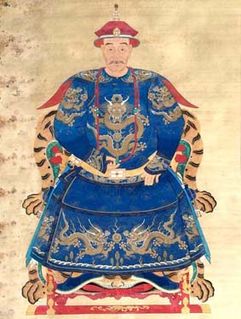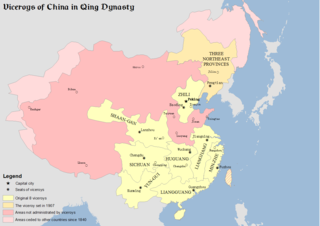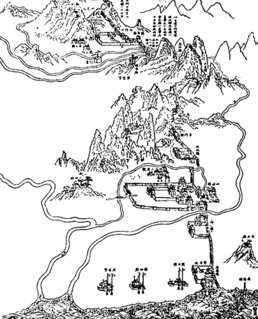
Dorgon, also Prince Rui, was a Manchu prince and regent of the early Qing dynasty. Born in the House of Aisin-Gioro as the 14th son of Nurhaci, Dorgon started his career in military campaigns against the Ming dynasty, Mongols and Koreans during the reign of his eighth brother, Hong Taiji, who succeeded their father.

The Shunzhi Emperor was Emperor of the Qing dynasty from 1644 to 1661, and the first Qing emperor to rule over China proper. A committee of Manchu princes chose him to succeed his father, Hong Taiji (1592–1643), in September 1643, when he was six years old. The princes also appointed two co-regents: Dorgon (1612–1650), the 14th son of the Qing dynasty's founder Nurhaci (1559–1626), and Jirgalang (1599–1655), one of Nurhaci's nephews, both of whom were members of the Qing imperial clan.

Wu Sangui, courtesy name Changbai (長白) or Changbo (長伯), 1612 – 2 October 1678, was a Chinese military leader who played an instrumental role in the fall of the Ming dynasty and the establishment of the Qing dynasty in its place.

Chen Yuanyuan (1624–1681) was a courtesan who lived during the late Ming and early Qing dynasties. She was the concubine of Wu Sangui, the Ming dynasty general who surrendered Shanhai Pass to the Manchu Qing dynasty, and later rebelled in the Revolt of the Three Feudatories. Chen's life and relationship to Wu later became the subject of a number of popular stories and legends, many of them focusing on her supposed role in Wu's fateful decision to defect to the Qing, thereby sealing the fate of the Ming dynasty.

The Revolt of the Three Feudatories, also known as the Rebellion of Wu Sangui, was a rebellion in China lasting from 1673 to 1681, during the early reign of the Kangxi Emperor of the Qing dynasty (1644–1912). The revolt was led by the three lords of the fiefdoms in Yunnan, Guangdong and Fujian provinces against the Qing central government. These hereditary titles had been given to prominent Han Chinese defectors who had helped the Manchu conquer China during the transition from Ming to Qing. The feudatories were supported by Zheng Jing's Kingdom of Tungning in Taiwan, which sent forces to invade Mainland China. Additionally, minor Han military figures, such as Wang Fuchen and the Chahar Mongols, also revolted against Qing rule. After the last remaining Han resistance had been put down, the former princely titles were abolished.
The Yongli Emperor, personal name Zhu Youlang, was the fourth and last emperor of the Southern Ming dynasty. His era name means "Perpetual calendar".

Zheng Jing, Prince of Yanping, courtesy names Xianzhi (賢之) and Yuanzhi (元之), pseudonym Shitian (式天), was a 17th-century Chinese warlord, Ming dynasty loyalist and ruler of the Kingdom of Tungning in Taiwan.

Zongdu, usually translated as Viceroy, Head of State or Governor-General, governed one territory or more provinces of China during the Ming and Qing dynasties.

The Battle of Shanhai Pass, fought on May 27, 1644 at Shanhai Pass at the eastern end of the Great Wall of China, was a decisive battle leading to the beginning of the Qing dynasty rule in China proper. There, Qing Prince-Regent Dorgon allied with former Ming general Wu Sangui to defeat rebel leader Li Zicheng of the Shun dynasty, allowing Dorgon and the Manchus to rapidly conquer Beijing and replace the Ming dynasty.
This is a chronicle of important events that took place under the Shunzhi Emperor of the Qing dynasty (1636–1912). It spans from the death of his predecessor Hong Taiji in September 1643, to the emperor's own death on 5 February 1661, seven days into the eighteenth year of the Shunzhi reign period. These dates do not correspond perfectly with the Shunzhi era itself, which started on 8 February 1644—on New Year's Day of the lunisolar year following the emperor's accession—and ended on 17 February 1662, more than one solar year after the emperor's death. The posthumous events related to the Shunzhi Emperor's burial and posthumous cult are also included.
Li Ting-kuo was a military general who fought for the Southern Ming against the Qing Dynasty.

Shang Kexi was a Chinese general of the Ming and Qing Dynasties. His family had migrated to Liaodong in 1576 and his father, Shang Xueli, served in the army guarding the northeast frontier. As his father did, Shang Kexi joined the army and guarded the frontier against the attack of the Jurchens. Shang was described to be a brave and resourceful man who was skilful at mounted archery and capable in military matters.

The Affaire in the Swing Age, also known as The Dynasty or Love Against Kingship, is a 2003 Chinese television series based on the novel Jiangshan Fengyu Qing by Zhu Sujin, who was also the screenwriter for the series. The series depicts the events in the transition of the Ming dynasty to the Qing dynasty in China, focusing on the lives of historical figures such as Li Zicheng, Wu Sangui, Chen Yuanyuan, the Chongzhen Emperor and Huangtaiji.

The transition from Ming to Qing, Ming–Qing transition, or Manchu invasion of China from 1618 to 1683 saw the transition between two major dynasties in Chinese history. It was the decades-long conflict between the emergent Qing dynasty (清朝), the incumbent Ming dynasty (明朝), and several smaller factions in China. It ended with the rise of the Qing, and the fall of the Ming and other factions.
Wu Yingxiong was a Chinese aristocrat and the eldest son of Chinese military general Wu Sangui who was instrumental in the fall of the Ming Dynasty and the establishment of the Qing Dynasty in 1644.
Events from the year 1662 in China.
Events from the year 1663 in China. Also known as 壬寅 4359 or 4299 to 卯年 4360 or 4300 in the Earthly Branches calendar.
Events from the year 1667 in China.
Events from the year 1673 in China.
Events from the year 1674 in China.











